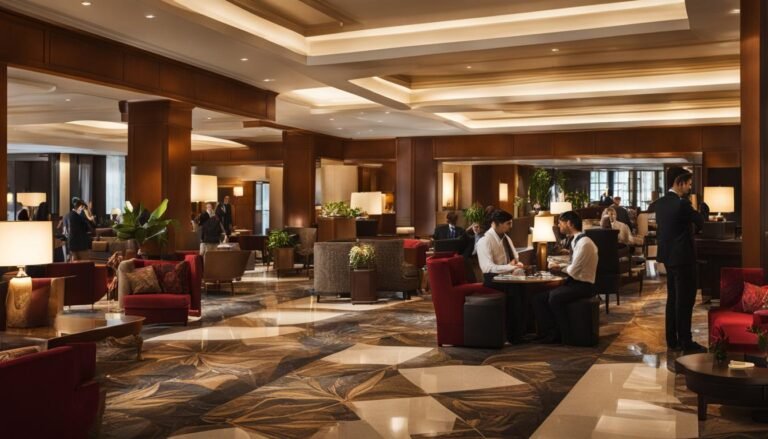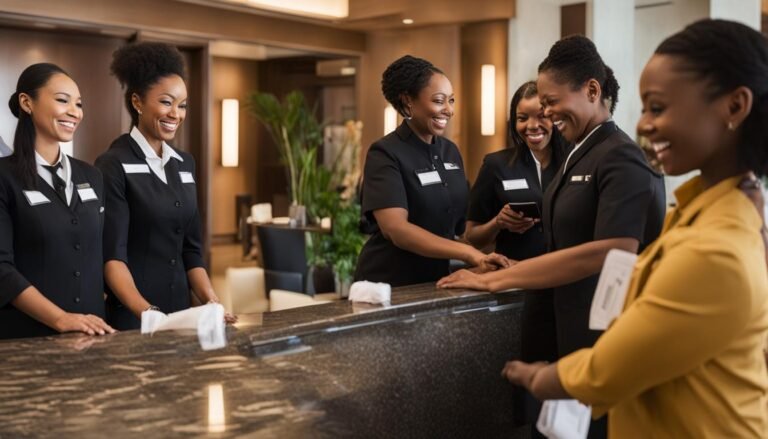Building a Strong Team Culture in Hotels and Resorts
Establishing a strong team culture is paramount in the hospitality industry, particularly in hotels and resorts where guest satisfaction hinges on the seamless collaboration of staff across various departments.
The success of a hospitality establishment is significantly influenced by the cohesion, motivation, and sense of belonging among its team members.
In this discussion, we will explore the critical importance of team culture in elevating the guest experience, examine effective strategies for fostering collaboration, delve into the crucial role of leadership in cultivating a positive work environment, and consider methods for measuring and enhancing team culture success.
Join us as we uncover the key elements that contribute to a thriving team culture within the context of hotels and resorts.
Key Takeaways
- Fostering a strong team culture directly impacts guest experience and the success of the establishment.
- A positive team culture enhances employee satisfaction and contributes to staff retention.
- Leadership's role in cultivating a positive environment is crucial.
- Measuring and improving team culture success is important for maintaining high levels of guest satisfaction and loyalty.
Importance of Team Culture in Hospitality
The importance of fostering a strong team culture in the hospitality industry cannot be overstated, as it directly impacts the overall guest experience and the success of the establishment.
A positive team culture not only contributes to staff retention but also enhances employee satisfaction. In the competitive and fast-paced environment of hotels and resorts, retaining skilled and experienced staff is vital.
A strong team culture fosters a sense of belonging and loyalty among employees, reducing turnover rates and the associated costs of recruitment and training.
Furthermore, employee satisfaction is closely linked to the quality of service provided to guests. When staff feel valued, supported, and engaged, they are more likely to deliver exceptional customer experiences, leading to higher guest satisfaction and repeat business.
Research has consistently shown that a positive work environment and a strong team culture are key drivers of employee satisfaction.
Therefore, investing in building and maintaining a cohesive team culture is not just beneficial but essential for the long-term success of any hospitality establishment.
Strategies for Fostering Team Collaboration
Fostering team collaboration in the hospitality industry is imperative for maintaining a positive team culture and maximizing the overall guest experience. To achieve this, it is essential to understand and leverage effective team dynamics and communication techniques.
One strategy for fostering team collaboration is to promote open and transparent communication among team members. Encouraging regular team meetings, where everyone has the opportunity to share their thoughts and ideas, can help in creating a collaborative environment.
Additionally, establishing clear goals and expectations can provide a sense of direction and purpose for the team, leading to improved collaboration.
Another effective strategy is to leverage team-building activities that promote trust, respect, and understanding among team members. These activities can range from problem-solving exercises to outdoor team-building adventures, all aimed at improving the overall cohesiveness of the team.
Furthermore, providing opportunities for cross-departmental collaboration and knowledge-sharing can break down silos and foster a more collaborative environment.
Leadership's Role in Cultivating a Positive Environment
In cultivating a positive environment within hotels and resorts, effective leadership plays a pivotal role in setting the tone for team culture and fostering a sense of camaraderie among staff members. Leadership influence is key in shaping the overall atmosphere and employee experience, ultimately impacting guest satisfaction and business success.
Here are three crucial ways in which leadership contributes to cultivating a positive environment:
- Setting the Example: Strong leaders exemplify the behaviors and attitudes they wish to see in their team members. By consistently demonstrating positivity, transparency, and respect, they establish a foundation for a supportive and uplifting work environment.
- Empowering and Supporting Staff: Effective leaders empower their teams by providing them with the resources, training, and autonomy necessary to excel in their roles. They also offer unwavering support, encouragement, and constructive feedback, fostering a sense of trust and confidence among staff members.
- Promoting Open Communication: Leaders create an environment where open and honest communication is encouraged. This transparency allows for the free exchange of ideas, concerns, and feedback, leading to a more cohesive and harmonious workplace.
Impact of Team Culture on Guest Experience
Effective leadership's influence on team culture extends beyond the internal dynamics of a hotel or resort, significantly impacting the overall guest experience and satisfaction. A cohesive team culture directly correlates with guest satisfaction, as it sets the tone for the level of service provided. When hotel staff work cohesively, it creates a seamless and enjoyable experience for guests, leading to higher satisfaction levels and increased likelihood of return visits. The table below illustrates the direct impact of team culture on guest experience and satisfaction:
| Impact of Team Culture on Guest Experience | |
|---|---|
| Positive Team Culture | |
| Improved guest interactions | |
| Enhanced service delivery | |
| Consistent guest satisfaction |
A positive team culture fosters improved guest interactions, leading to enhanced service delivery and consistent guest satisfaction. On the other hand, a fragmented team culture can result in inconsistent service quality, negatively impacting the overall guest experience. Therefore, investing in and nurturing a strong team culture is crucial for ensuring exceptional guest satisfaction and loyalty.
Measuring and Improving Team Culture Success
Measuring and enhancing team culture success in hotels and resorts is imperative for maintaining high levels of guest satisfaction and loyalty. To achieve this, it's essential to focus on measuring success and continuous improvement. Here are key points to consider:
- Employee Engagement Surveys: Regular surveys can provide insights into the overall satisfaction and engagement levels of the team. This data can be instrumental in identifying areas for improvement and tracking progress over time.
- Performance Metrics: Establishing key performance indicators (KPIs) related to teamwork, communication, and guest satisfaction can help in quantifying the impact of team culture on the overall success of the hotel or resort.
- Feedback Mechanisms: Implementing robust feedback mechanisms, such as regular performance reviews and open communication channels, allows for continuous feedback loops that aid in identifying areas of strength and opportunities for growth within the team culture.
Conclusion
In conclusion, the importance of team culture in hotels and resorts cannot be overstated. It is essential for fostering a positive environment, improving guest experiences, and ultimately, driving business success.
By implementing strategies for collaboration, and with strong leadership, hotels and resorts can measure and improve their team culture.
However, it's ironic that while the focus is on creating a positive team culture, the absence of it can have detrimental effects on the overall guest experience.






